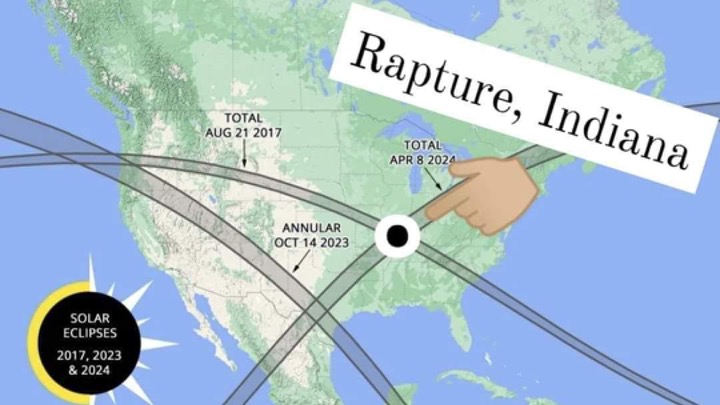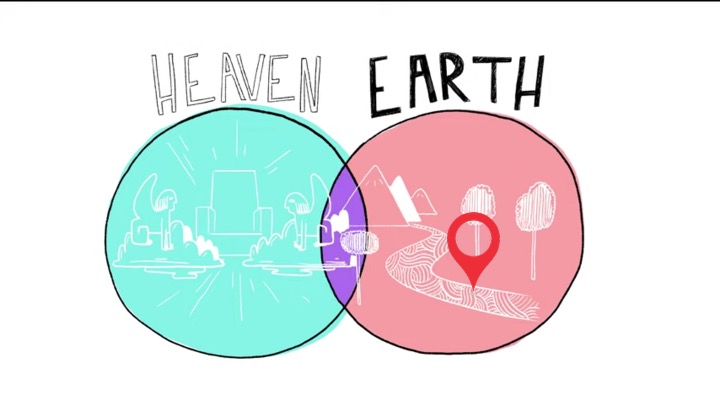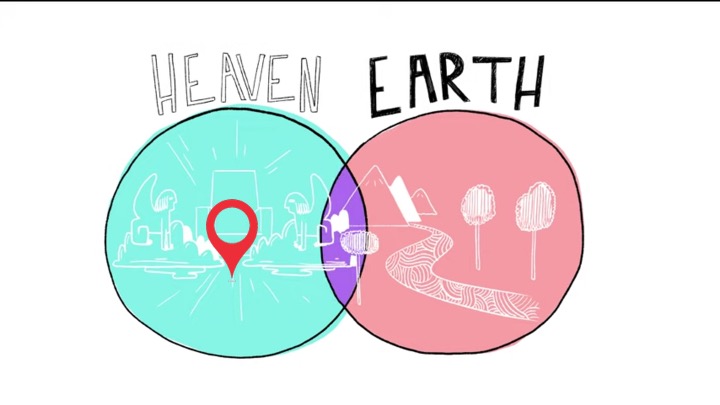This was part one of a sermon series preached at City South Presbyterian Church in 2024. You can listen to this on our podcast, or watch the video.

I do not know if you are the sort of person who follows news stories about strange phenomenon in the heavens — notable movements of planets, and stars, and the sun.
It turns out there are some heavenly events where if you want to look at them you need special glasses like this:

There was a total solar eclipse visible across a particular band of the U.S. in April 2024, and, well, when people looked at this heavenly light — or the darkness of the eclipse without special glasses — let us just say Google searches for “My eyes hurt” spiked specifically along the path of the eclipse as people looked to the heavens.
This event was not just big for sun watchers — there is a strand of Christian theology that teaches there will be a rapture as Jesus returns; where faithful Christians waiting for his return will be swept up in the skies into heaven — some of you might read the New Testament this way.
Rapture watchers in the U.S. were particularly excited that the town of Rapture, Indiana was in the direct path of the eclipse.

There is a little bit of a problem I think we hit when we want every prophecy to directly apply to the modern western world — and our brothers and sisters in the U.S. are sometimes particularly guilty of thinking these prophecies are going to be triggered events in their nation.
Anyway — this rapture idea is the idea that heaven is this skywards reality where, for God’s future to unfold, we need to be sucked up into heaven, and in some versions there forever in disembodied form — our souls living in this alternate universe forever in the future. If you wanted to map this out — and these are stills from a Bible Project video that is well worth a look — you would, in ‘rapture’ thinking treat heaven and earth as separate spheres, where we are presently living on earth but heaven is our future.

If that is your view then life on earth is about getting rapture ready, or ready for heaven — both for you, and for people you love. How we view heavenly phenomenon and where we are in the scheme of things actually shapes how we live now — and how we interpret events going on around us, even in the skies.
This series is an attempt to orient us; to help us think about where we are — how heaven and earth work, and how that shapes our life as people who believe the Gospel of Jesus.
If you have been around for a bit you will have seen this picture before — it is an attempt to show how ancient people — readers of the Old and New Testaments — would have pictured reality — where earth is a present reality for us creatures — while heaven is a present reality for the spiritual realm; God and other heavenly beings — sky beings.

And we can think of ourselves living earthly lives, cut off from any sort of heavenly reality…or denying it exists…

Or be, as the saying goes “so caught up in heavenly realities we are of no use on earth.”

The sweet spot — the spot that is our challenge as followers of Jesus who are dwelling places of God’s Holy Spirit — is to live in this overlapping reality — because this is where we are.

We are going to spend some time thinking about what this means — to live here — how we do it, and especially how to imagine heaven — from what we are given in the Bible — in ways that shape the way we live on earth. We are people who now live before the throne of God in heaven. We have access to heaven now — as a present reality, not a future one — and this is especially true as we pray — communing with God — and as we worship him. The time we spend “before the throne” will shape how we live.
In his opening to Ephesians, Paul says God, the Father of our Lord Jesus, has blessed us — he is talking about those who have found life in the story of the Gospel — it is possible in the first instance that the “us” he is describing is specifically Jewish Christians (Ephesians 1:3), but he will come back to apply all this to Gentiles as well in verse 13 — saying we are also included in Christ through the Gospel (Ephesians 1:13). God has blessed those of us who have had the Gospel change how we see reality; giving us the map. He says Jesus has blessed us — that is in the present tense — in the heavenly realms — this is not a future thing — with every blessing in Jesus (Ephesians 1:3).
His summary of the Gospel is this picture of God bringing all things in heaven and on earth under Christ — there is a hint here that heaven and earth are realities that will continue forever under God’s plan, but be united (Ephesians 1:8–10). Those of us who have believed that Jesus is the fulfilment and ruler of all things receive the Holy Spirit — becoming heaven-on-earth people — united to Jesus (Ephesians 1:13–14).
Paul opens his letter praying for his readers — that their eyes — or rather the eyes of their hearts — and by extension ours — might be opened to this reality behind the Gospel. Enlightened (Ephesians 1:18). Now, I reckon there is a story behind this idea of enlightening — Paul’s story. The story of when Paul met Jesus and had a vision of heavenly reality.
Paul’s back story in Acts actually begins with this bloke named Stephen. Stephen was one of the blokes appointed by the apostles to wait on tables and serve people so they could be freed to preach — and, well, he does not quite get the memo, because he preaches too. Stephen is seized and brought to the leaders of the Sanhedrin — the temple authorities. Stephen gives a sermon unpacking God’s good news story — the Gospel of Jesus. And it makes the watching crowd so furious they decide to kill him (Acts 7:54). And as the mob descends Stephen, full of the Holy Spirit — remember Paul’s words in Ephesians — looks to heaven — and this is not just the sky, he is looking into the throne room of heaven — heaven opened up — where he sees the glory of God — that is this Old Testament idea of an overpoweringly bright light — and Jesus, standing at the right hand of God — as the Son of Man from Daniel; the Son of God — the human and divine king. He sees this, and he tells them he is seeing it (Acts 7:55–56). At this the crowd starts stoning him to death, and Luke tells us this happens under the watchful eye of this Sanhedrin young gun named Saul — that is Paul (Acts 7:57–58).
As he dies Stephen keeps his gaze on the heavenly throne room and he speaks to the king he sees there — “Lord Jesus receive my Spirit” — and he echoes the words of Jesus on the cross when he said “Father forgive them” — and he dies (Acts 7:59–60). And Saul approves of his killing (Acts 8:1). In fact, Saul will go on to get papers from the Sanhedrin allowing him to kill anybody like Stephen he finds; he is going to destroy the church — going house to house (Acts 8:3).
And you might know the story — on the road to Damascus he is overwhelmed by a bright light from heaven (Acts 9:3–4). He is not wearing his special glasses — so his eyes hurt; he goes blind. He hears a voice, from heaven, saying “Saul, why are you persecuting me?” — and it is the voice of Jesus (Acts 9:5) — the Son of Man Stephen saw in the throne room speaking to him — and I reckon Paul is having the same sort of vision Stephen did.
But when he opens his eyes back to earthly realities after this heavenly encounter, he cannot see; the old Saul has been eclipsed (Acts 9:8). And a new man emerges as his eyes are opened; as a bloke named Ananias is sent by Jesus to restore his sight as he receives the Spirit (Acts 9:17). His eyes are opened as this happens (Acts 9:18), but I reckon the eyes of his heart have been opened by this heavenly encounter and his receiving God’s Spirit too — and he marks this by being baptised. From here on in Paul lives his life as someone who sees heaven and earth differently; shaped by his vision on the road of the risen and ascended Jesus.
I think Paul is reflecting on this experience when he writes some weird stuff in 2 Corinthians boasting about this “guy he knows” who was caught up into heaven — in paradise — where he saw inexpressible things (2 Corinthians 12:2–4). And his prayer for people reading Ephesians is that we might be swept up in this same life-altering vision of reality (Ephesians 1:18); that just as his encounter with heavenly light changed the way he sees everything, he wants this experience for everyone; that the eyes of our hearts might be enlightened (Acts 9:3; Ephesians 1:18); that we might see this heavenly reality so we know the hope we have been called to — the power of God at work in us (Ephesians 1:18–19) — not just to pull us to heaven when we die or in a rapture. God’s power is the power that raised Jesus from the dead — resurrecting power — and it is ascending power — it raised and seated him in the heavenly realms above all these other powers. It is the power God is ultimately going to use to reconcile all things — heaven and earth — through Jesus (Ephesians 1:19–21).
And this power is applied to us already, because again, this bit is present tense — as Paul talks about our lives now — where we are now. God has already raised us up with Christ and already seated us with him in the heavenly realms in Christ Jesus — that reality Stephen saw, so that he could see heaven opened and speak to Jesus as he was stoned to death, is our reality. This is where we are, in some sense, even while we are on the earth in our bodies (Ephesians 2:6).
This is a sort of mind-bending thing — Paul will write about it in other places, like in Colossians — this being our present reality. Since God has raised us with Christ — who is seated in the heavenly realms at God’s right hand, his human king in the heavenly throne room — this is where our hearts should be set (Colossians 3:1). And then our minds should be set — not on earthly things, but on heaven (Colossians 3:2–3). There is some sort of experiential thing we are meant to have because this is where we are… because it is where Jesus is. And this is what we are grappling with in this series.
Now. This is a challenge — right? We all know that bodily we are located physically in the very space we occupy as we read these words (or watch or listen), trying to get your head around this idea. I am not claiming this is simple, but the Bible is claiming it is true — and we are probing into what it means to live as though this is true — to know where we are on the map. In Colossians Paul sees this transition in how we think about where we are as part of how we are remade for life on earth.
Being transformed so that the image we bear is renewed and reflects the life and nature of its creator; the one enthroned in heaven as we see him revealed by his Son (Colossians 3:9–10).
So we live in this sweet spot.
Somehow, as our hearts and minds are opened up — as we see this heavenly reality — it is going to transform the way we live on earth. And there are — it seems — ways we can orient ourselves and locate ourselves in this overlapping reality so that it changes how we live — or die — like it does for Stephen and for Paul, and has for so many followers of Jesus since.
Part of this is about access — we are not excluded from God’s presence any more. If we conceive of heaven as a throne room where God rules — and we will spend some time looking at how the Bible pictures this sort of throne room — we are not kept out by guardian creatures with flaming swords. We are no longer far away from God, exiled from him.
Through his death and resurrection and ascension, and by giving us his Spirit, Jesus has brought us near — we are united to him; where he is, we are.
And we now have access to the Father through his Spirit who dwells in us (Ephesians 2:13, 18). We are situated there whether we are thinking about it or not, but I think one of the ways we should understand accessing the throne room is that we do this every time we pray; as we shut our eyes to earth we are opening them to heaven. But this is not just meant to pull us out of earth — rapturing us. Heaven is not our future reality; living in this space in the present also changes how we see life on earth. In the ancient imagination both images of gods and temples were heaven-meets-earth people and places.
Paul says as we are joined to each other and to Jesus by the Spirit we are a holy temple; a heaven-on-earth community built together as a dwelling place of God — by his Spirit — on earth — who are also united by his Spirit in heaven. So we approach God together as a sort of human temple — or priests — as we worship God; as we pray and recognise where we are together in our gathering and praising God (Ephesians 2:21–22). And I reckon the way we encounter God as those raised and seated with him is part of how God creates us in Christ Jesus. This word “handiwork” — it is the sort of word used of a craftsman. We are fashioned by God in Jesus to do good works on earth God has prepared in advance for us to do; we are his image-bearers crafted by him to bring heaven to earth as we embrace this new reality (Ephesians 2:10).
Paul’s prayer is that we — not so much with our earthly eyes — but with our hearts — as our hearts meet God’s Spirit — we might see this truth: that we are located in the heavenly throne room; seated with Jesus — that we have access to God — proximity to him — as beloved children of the Father who can approach him not just to ask him for things, but to come to know him (Ephesians 1:18; 2:6, 18).
There is a little hint of the Lord’s Prayer in the mix here I reckon — as Jesus teaches his disciples that we can approach God as our Father in heaven — that is a location — asking that his name be made holy; that his kingdom might come — his rule be reflected as his will is done on earth as it is in heaven (Matthew 6:9–10). We only get a sense of what “in heaven” looks like as people in this kingdom if we spend time with our hearts and minds set on things above. We can only operate in this middle space in our bodies — as God’s handiwork and temple — bringing heaven to earth if we are captured by this vision of Jesus on his throne with his Father and that glorious light; like Stephen or like Paul.
And look — the pun is way overdone so I am sorry — but Paul is inviting us to be people who stare at the overwhelming brightness of the heavenly body of the Son, and the glory of his Father — not with special glasses, but by his Spirit. I am sorry… truly.
We do not need a rapture to take us into heaven — we are already there, and perhaps all we need is to see; to close our eyes in prayer and open our imaginations to see ourselves located before the throne; to have Stephen’s vision or Paul’s encounter with the resurrected Jesus occupy the eyes of our hearts.
One of the things I am hoping we might do in this series is think about how we engage our imaginations as we pray and praise God — as we come into the throne room. I am convinced that there are words on the pages of the Bible that are poetic — they convey images — and that these images might help us set our hearts and minds on things above; they might help us close our eyes to earth and open them to heaven and be useful metaphors or images that we can talk about, and picture — and perhaps even meditate on or contemplate as we encounter created images — art, or natural phenomenon — that help us set our eyes upon heaven. We will look at one a week — though they will overlap — and this week it is this idea of God being light — bright, overwhelming, blinding light — light that would make our eyes hurt if they had not been adjusted or enlightened so we can gaze upon it. There is a really rich thread of this metaphor you will find all through the Bible — from Moses through to Paul — and in descriptions of heaven — whether that is with Stephen, or in Revelation, or in the Old Testament prophets.
Like in Ezekiel, who describes Yahweh on his heavenly throne as almost impossible to look upon because of the radiance or gleam of his glory — gleaming, fiery, bright glory (Ezekiel 1:27). I wonder if as you pray you ever picture God as you speak to him, or his throne room. Part of this series was prompted by me realising that for a long time I kind of imagined God as just a bigger cosmic version of my dad. Now, you could psychologise that for me; I reckon it is a sign both that my dad did not do a terrible job of being a father — and there are lots of ways I know the image of God as a Father is confronting and challenging for people where that has not been your experience, and ways that image could be super unhelpful. And I kind of pushed into my thinking here because I reckon we have a tendency to fashion God in our own image in our imagination, not to look so much to the pictures we get in the Bible — and I was wondering what it would look like to pray imagining the God Ezekiel pictures on the throne he pictures in a way that crashes through our false imaginings… Or at least to see prayer as opening the eyes of my heart; setting it on things above. Imagining heaven the way the Bible invites us to.
And so I wonder what it would look like to pray, taking some of the images from these passages to fuel your imaginatoin; if as we close our eyes and reflect on this image for a bit — we might see this sort of picture in your heart differently as we approach God and locate ourselves in heaven; seeing not just the shining, radiant bright God, but his Son next to him. A Son of Light — light from light as we say in the Creed — or, as John’s Gospel puts it — Jesus is the light who shines in the darkness (John 1:4–5). He also describes God as light in one of his letters (1 John 1:5).
Both John and Paul use this language of coming into the light and being children of the light to describe having access to God again (Ephesians 5:8), and giving him access to us as we invite him to dwell in us by his Spirit. As we see God as this glorious, purifying, life-giving light who destroys darkness — the powers of sin, and death, and the ruler of the kingdom of the air — Satan — through Jesus. As we see God the way Stephen and Paul see him. As we come into his light we let this light expose us and kill those bits subject to earthly or other spiritual powers so we are illuminated; shining like Jesus does — shaped as children of the light (Ephesians 5:13).
I am going to invite you to use your imagination a you pray; to see yourself stepping into this light; being exposed; exposing yourself to God in ways that bring these things Jesus has destroyed to him to have them destroyed, so that we, his people, might become a light to the world. Pray Paul’s prayer that the eyes of your heart might be enlightened; that we might be those who gaze at the bright light of heaven; eyes opened to heavenly realities by the lens of the Spirit — that we might see him — without fancy glasses.
I want to suggest a bit of an exercise for you this week too — and I want you to be careful not to burn your eyes. I want you to make some time this week to head outside, on a sunny day — and just glance up at the sun and get a sense of its brightness. It is not as bright as the God who is light; it is an analogy of God’s brightness. Glance at the sun and then pray imagining yourself drawn into this light.
I hope that as we are able to see; to imagine; to position ourselves with Jesus in the heavenly realm it might help us see earthly life with a different perspective — whether we are facing suffering — even persecution — like Stephen, or tempted to hide in the darkness and wallow in sin; being caught up in the things of this world — the light might expose those as deadly and hollow and destructive. It might help us see heaven as this ultimate reality — a present and a future — so we devote ourselves to seeing God’s kingdom come on earth as in heaven — catching the vision that saw Paul turn from destroying God’s church to praying we be enlightened and swept up into God’s heaven-on-earth plan as those who have the power of God working in us.
You might not want to be part of this sort of weirdness — I totally get it. This is uncharted territory for most of us. But if you are someone who has been raised and seated in the heavenly realms — I want to invite you out of the comfort zone of your seat, and into this heavenly location, to experiment with praying imagining yourself entering the gloriously bright throne room of heaven as the Bible describes it.


